- News
- Horse Racing
- Racing Preview
- AQHA Racing Challenge
- Breeding
- Sales
- Quick Stakes Results
- Detail Race Results
- Qualifiers
- Leader Board
- Leading Sires
- Videos
- Auction Leaders
- Q-Racing
Streaming Video
© iStock

LOS ALAMITOS, CA–OCTOBER 3, 2024–Devastating news hit the stables of Hall of Fame trainer M. Heath Taylor on Thursday, October 3. Several of his top horses came up positive for EIA on the Coggins test, and immediate action has taken place.
"This is one the worst and hardest things I've encountered in my life, let alone my career," said Taylor. "Spanning 29 years of training in seventeen different states with over 10,000 starts, nothing like this has ever happened to me."
A Coggins test is a critical blood test used to detect Equine Infection Anemia (EIA), a potentially fatal viral disease in horses. There is no known treatment, and infected horses pose a risk to all other horses. Horses that are positive for EIA can either be placed in lifetime quarantine or humanely euthanized.
A positive result on a Coggins test indicates that a horse has been exposed to the EIA virus and is likely infected. In most cases, a second test will be submitted to confirm this infection. Then, steps must be taken to prevent the spread of the virus, including quarantine or euthanasia.
Choosing the best options after a positive Coggins test is not just a matter of personal choice; legal and ethical considerations also govern it. Horse owners are faced with two options.
One option is lifetime quarantine, in which, in some cases, a horse infected with the EIA virus may be allowed to live out its life in strict isolation. This option requires dedicated facilities and extreme regulations, as the infected horse will remain a lifelong carrier of the virus.
The next option is humane euthanasia. While difficult, euthanasia is often recommended or required by local laws to protect the broader horse population, as there is no cure for EIA and the disease is highly transmissible.
The positive Coggins tests stemmed from the horses in Taylor's barn who participated in the Downs at Albuquerque meet. All horses that were positive prior to August 28, 2024, had tested negative once the meet ended. Otherwise, they would not have been allowed to move to other racetracks.
In a recent discovery, the same horses that tested negative for EIA have retested positive on their Coggins at multiple other racetracks. The list of horses that were infected is not available at present for the sake of owner protection, privacy, and insurance claim purposes.
"Contrary to what has gotten around, this isn't just impacting one of my owners. Unfortunately, it is affecting many of my owners," said Taylor.
Heath Taylor and all involved are working closely and in compliance with all state and federal agents at all levels. This is a profound wound to the industry and has been the most harrowing experience of his career. The infection's entire cause and starting point has yet to be determined.
It is with heavy hearts that Heath Taylor and his many owners have decided to euthanize the horses affected by this disease.
"This is such a sad and horrible time for us in my barns. All of the horses looked great, with no sign of illness or distress, looking as if they could all head to the paddock and compete in a race today. Instead, it was an unthinkable scene of watching grooms lead over horses, which have been their livelihoods, like mine, and to see those horses put down. It is just heartbreaking."
Heath Taylor's barn experienced a once-in-a-lifetime flood at Ruidoso. It was the only barn with water, contamination, sewage, and filth up to the horse's chest while trying to get out of swamp-like conditions.
Taylor commented, "We assure full transparency once the cause is known. At the current time we thank the hundreds of supporters who have reached out in this difficult time."

 Newsletters
Newsletters Facebook
Facebook